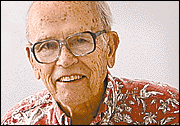Advertisement - Click to support our sponsors.


Hawaii’s World
WHAT does Hawaii's Gen. Frederick C. Weyand have in common with President Dwight Eisenhower, Bob Hope and Henry Kissinger? Gen. Weyand
is honored by
Association of
U.S. ArmyHe has joined them as the recipient of the George C. Marshall Medal for outstanding service to the United States of America, a choice made annually by the Association of the United States Army.
Weyand retired to Hawaii after serving as Army chief of staff from 1974-76. Before that he led the U.S. Military Assistance Command in Vietnam as deputy commander and then its last commander. He was one of the last members of the American regular forces to depart Vietnam.
Weyand entered the Army in 1939 by way of the ROTC program at the University of California, Berkeley. He fought in the India-Burma theater in World War II, led troops in the Korean War and then Vietnam. He is still ramrod straight at 84. His retirement in Hawaii has seen him an active community participant. Hawaii Foodbank in 1999 made him its Patriot of the Year.
Vietnam still haunts Weyand. There is nothing humorous he can tell about it, this great story-teller told the Marshall Award dinner audience of 2,700 in Washington, D.C., in October. His key lesson learned from Vietnam, he said, is that "the support of the people we are sworn to defend is essential to the accomplishment of whatever mission is assigned to us."
The irony to him is that we won the Vietnam War on the ground but lost it in the political arena at home. He recommends a book entitled "A Better War," by Lewis (Bob) Sorley, that details the 1968-72 combat period.
It concurs that our forces broke the back of the Viet Cong insurgents from the North in the Tet offensive of 1968. We then, said Weyand, could have proceeded under Gen. Creighton Abrams to wrap up the war militarily.
INSTEAD we lost it at the Paris peace talks of 1969, where he was a participant. Our negotiating team by then, he said, had lost faith in our mission and the American people had withdrawn their support.
Hanoi's negotiators hectored our side with quotes from America's major newspapers and TV stations saying that the American people wanted out of the war.
"Somewhere along the way," Weyand told the Marshall Medal audience, "we lost sight of our objective."
Still rankling Weyand is an interview he did after the Tet victory with one of America's most respected TV journalists, Walter Cronkite. Weyand says he detailed how their heavy losses had broken the back of the Viet Cong insurgents beyond recovery.
Cronkite replied: "Well, you've got a fine story. But I'm not going to use any of it because I've been up to Hue. I've seen the thousands of bodies up there in mass graves and I'm determined to do all in my power to bring this war to an end as soon as possible."
It didn't seem to matter to Cronkite, Weyand said, that the bodies were of South Vietnamese citizens killed by the soldiers from the North. Weyand said it never was intended that the South would invade the North, only that America would help the South stave off the opposite.
Weyand praised the "superb leadership" of the Army's present chief of staff, Gen. Eric Shinseki of Hawaii, the first Nisei to so serve. He said Shinseki is taking the Army into a new era of mobility in which, daringly, our tanks are getting wheels and tires, instead of clanking metal treads, in order to move faster.
A.A. Smyser is the contributing editor
and former editor of the the Star-Bulletin
His column runs Tuesday and Thursday.